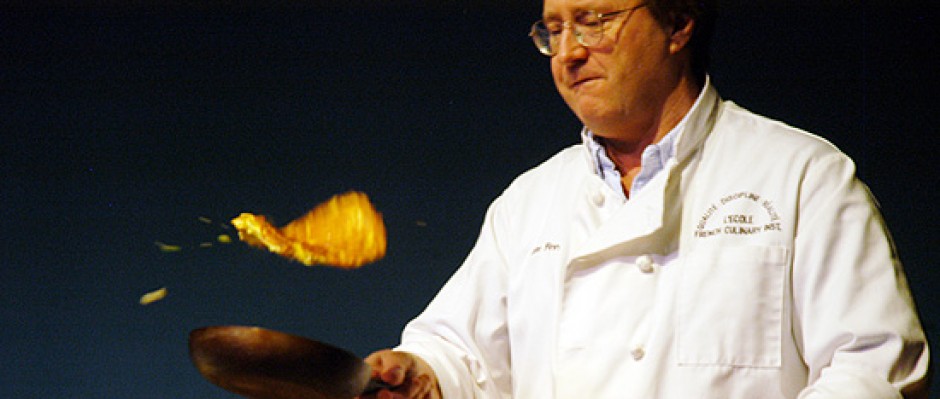
Professor of Government John Finn is a man who wears many hats. He has authored three books on constitutional law and testified before the House Judiciary Committee. Professor Finn took a sabbatical last spring, and one might naturally assume that he spent that time further deepening his scholarship on constitutional theory or lecturing to the public. But again, Finn is a man who wears many hats: He instead headed to Maine where he finished his first book on the subject of what makes the perfect omelet. The aptly titled, “The Perfect Omelet (A Cookbook and Philosophy),” due out this spring, is the triumph of Finn’s passion for cooking and food studies. He has become a true authority on the subject over the years—writing, teaching, cooking and philosophizing on all things omelets.
“[The book is about] omelets, sort of,” Finn wrote in an email to The Argus. “It’s fundamentally a book that advances a particular philosophy about how to cook and about how to live and, I suppose, about how to do scholarship.”
Over time, he has also been able to weave his passion for cooking into his career at the University. As recently as the Spring of 2015, he taught a class in Allbritton 311 called “A Perfect Omelet” through the Wesleyan Institute for Lifelong Learning. The course’s description makes it clear that the art of the omelet is a precarious business, where applying the wrong temperature, time, pan, or utensils may shift an exquisite omelet into the unsophisticated realm of the scrambled egg. But, as Finn writes, when done just right, the flawlessly executed omelet is a thing of beauty.
“When prepared properly, however, an omelet is a radiant, shimmering gift from heaven, creamy on the inside, enfolded by an outer layer of egg with the consistency and firmness of lace,” the course description reads.
Finn earned a degree from the French Culinary Institute in 1996, and has published articles on subjects ranging from Julia Child to the struggle to derive precise meaning from recipe instructions. His favorite chefs include Pierre Franey, Jacques Pepin, Sara Moulton, and, of course, the enduring Julia Child. However, it wasn’t a teacher or a famous chef he admires who piqued his interest in food, but someone much closer to home.
“My mother,” Finn said. “She was an accomplished cook and completely obsessed with finding the perfect recipe for the perfect omelet. Many years later, when I was in culinary school, I began to appreciate how deep her obsession ran and, more importantly, how much I had learned from her, and not just about omelets.”
Finn explained why omelets become his particular culinary obsession.
“And here’s the tease,” Finn said. “Why not omelets? I actually do spend a bit of time in the book looking after that question.”
He further elaborated on the diverse conversation he hopes to elicit from his book, and the intellectual ground it covers.
“I think of this book as a significant and serious bit of scholarly work—not just a cookbook; hence the subtitle (A Cookbook and Philosophy),” Finn said. “There are recipes, of course, but the book as a whole is an eclectic (sounds so much better than idiosyncratic) mix of politics, philosophy, history, literature, and memoir.”
The actual writing and recipe selection process was not the hardest part of producing “The Perfect Omelet” for Finn. Instead, he found it most trying to navigate the business side of being an author.
“Surprisingly, [the hardest part was] not recipe development,” Finn said. “I actually found that part both easy and exciting, and I have far more recipes and ideas for recipes than I can actually use in this one book. The most challenging part was getting a publisher who shared my vision of what the book should be—happily, I have a fantastic agent and a supportive circle of friends.”
Finn also explores what constitutes the perfect omelet in his course description. In it, he hopes to teach students how to cook their perfect omelet, a personal creation that embodies their culinary and gastronomical sensibilities. On the subject of his perfect omelet, Finn could clearly talk for hours.
“There is no perfect omelet,” Finn said. “And yes, you can make it yourself! Those two principles are the fundamental pillars of the philosophy of cooking I try to espouse. My favorite omelet, however, is probably a spirited dessert omelet made with rum, flambeed, and then garnished with crushed butter rum lifesavers. Or maybe an omelet with jalapeño bacon, plum tomatoes, and sour cream. Or an Omelette Dieppoise [omelet with lobster, shrimp, truffles, and tomatoes], or an omelet made of puree of asparagus and white wine.”
While Professor Finn said he enjoyed teaching his cooking and Government classes equally, he has one suggestion for the University that may allow him to finally merge these interests.
“I do wish we had a classroom fully equipped for cooking,” Finn said.



Leave a Reply